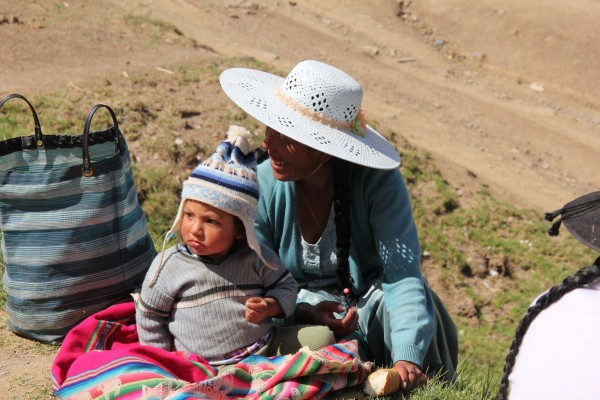The Difficulties of Higher Education Faced by Rural Women in Bolivia

The scene repeats itself again and again: the father saying to his daughter, “Why do you need to continue studying if you already know how to read and write? That is enough to be a good wife. That's how it was for your mother, and you see her...proud of her five children.”
The daughter realizes that there is no real communication taking place. How can she convey to his dad the eagerness in her heart, this passion to continue her studies? If, after all, the friend who finished high school with her is already married and expecting a baby? Besides...studying agricultural science? A woman? Someone filled up your head with nonsense…
And so the story repeats itself. In Bolivia, the Community of St. Paul is promoting the development of rural women, trying to break some of the age old taboos. In Totora Pampa, where the Community carries out several development projects, little by little, youth are finishing high school, and some are encouraged and daring enough to undertake university studies.
There is no point in blaming the parents, who are in need of hands to help the family. It’s hard for them to imagine a future different from the one they had, in which they could not study. The adventure of going to a university is almost unheard of in their communities, let alone for women. “From time to time, a young man will leave and be successful, but not you, my daughter,” a father would say to his daughter, doubting her ability and fearing the difficulties and risks that she might encounter on her road to becoming a professional.
That’s how it was going to be for Martha, a women among many, who nonetheless was able to change the course of her future. She studies agriculture in a boarding school, far from her home. Martha was clear about her future and had planned, upon finishing technical school, that she wanted to continue her studies and earn an engineering degree. The process is slow and costly, and her environment is not exactly supportive of her dream. We, at the Community of St. Paul, do support women like Martha and hope that many more like her will obtain the professional formation that they are seeking. In that way, the story, the same old movie of resignation and lack of higher education for women of Bolivian communities, doesn’t have to repeat itself indefinitely.
The daughter realizes that there is no real communication taking place. How can she convey to his dad the eagerness in her heart, this passion to continue her studies? If, after all, the friend who finished high school with her is already married and expecting a baby? Besides...studying agricultural science? A woman? Someone filled up your head with nonsense…
And so the story repeats itself. In Bolivia, the Community of St. Paul is promoting the development of rural women, trying to break some of the age old taboos. In Totora Pampa, where the Community carries out several development projects, little by little, youth are finishing high school, and some are encouraged and daring enough to undertake university studies.
There is no point in blaming the parents, who are in need of hands to help the family. It’s hard for them to imagine a future different from the one they had, in which they could not study. The adventure of going to a university is almost unheard of in their communities, let alone for women. “From time to time, a young man will leave and be successful, but not you, my daughter,” a father would say to his daughter, doubting her ability and fearing the difficulties and risks that she might encounter on her road to becoming a professional.
That’s how it was going to be for Martha, a women among many, who nonetheless was able to change the course of her future. She studies agriculture in a boarding school, far from her home. Martha was clear about her future and had planned, upon finishing technical school, that she wanted to continue her studies and earn an engineering degree. The process is slow and costly, and her environment is not exactly supportive of her dream. We, at the Community of St. Paul, do support women like Martha and hope that many more like her will obtain the professional formation that they are seeking. In that way, the story, the same old movie of resignation and lack of higher education for women of Bolivian communities, doesn’t have to repeat itself indefinitely.









